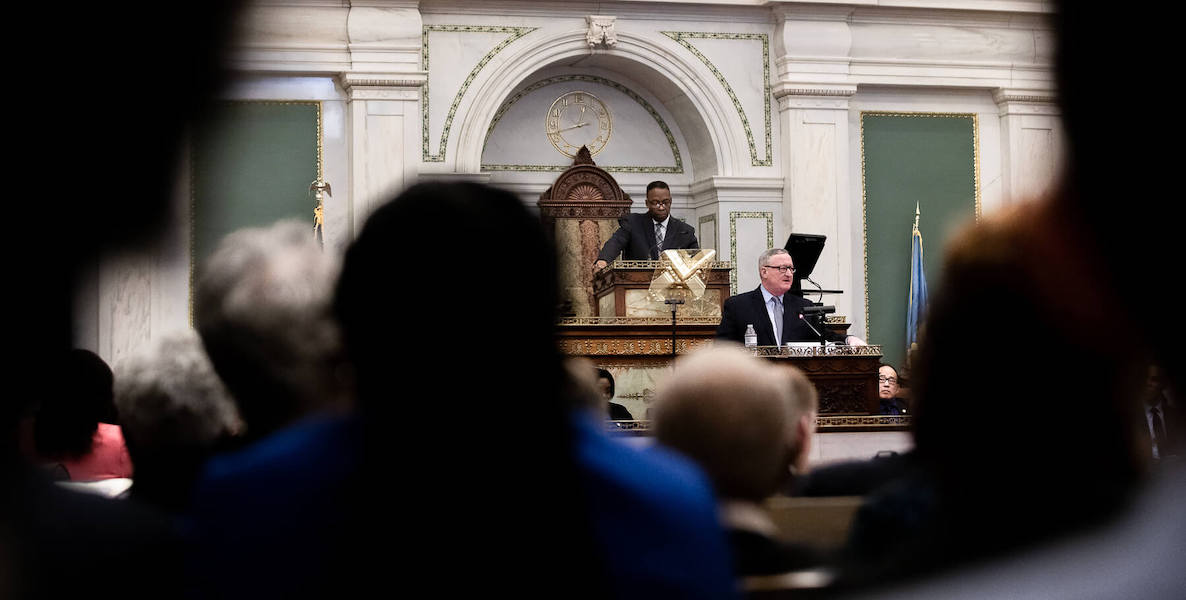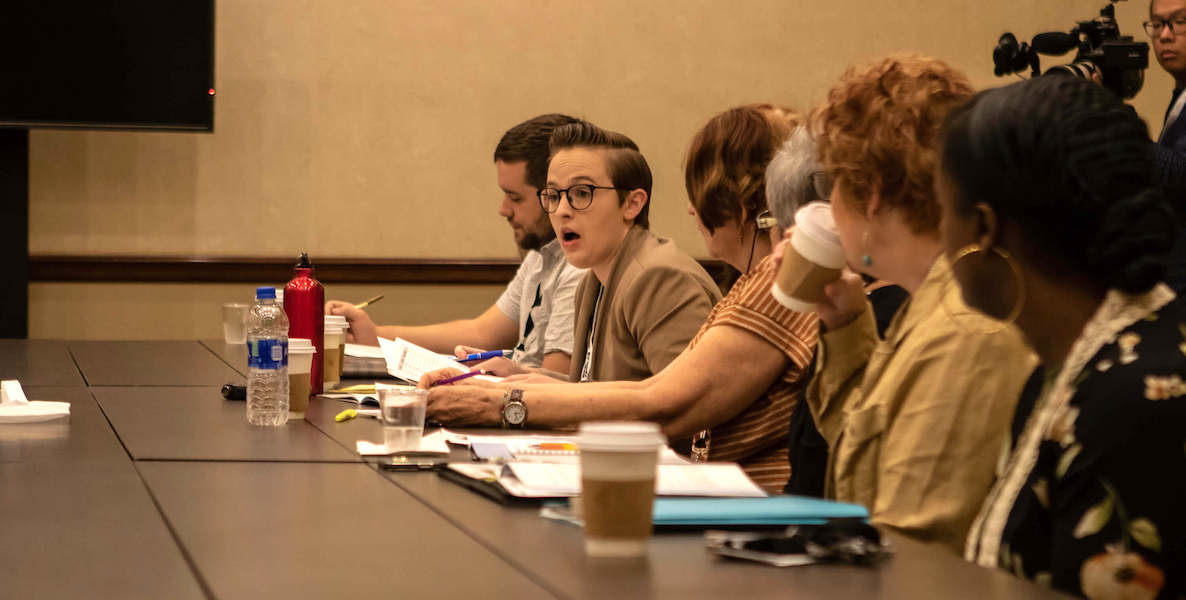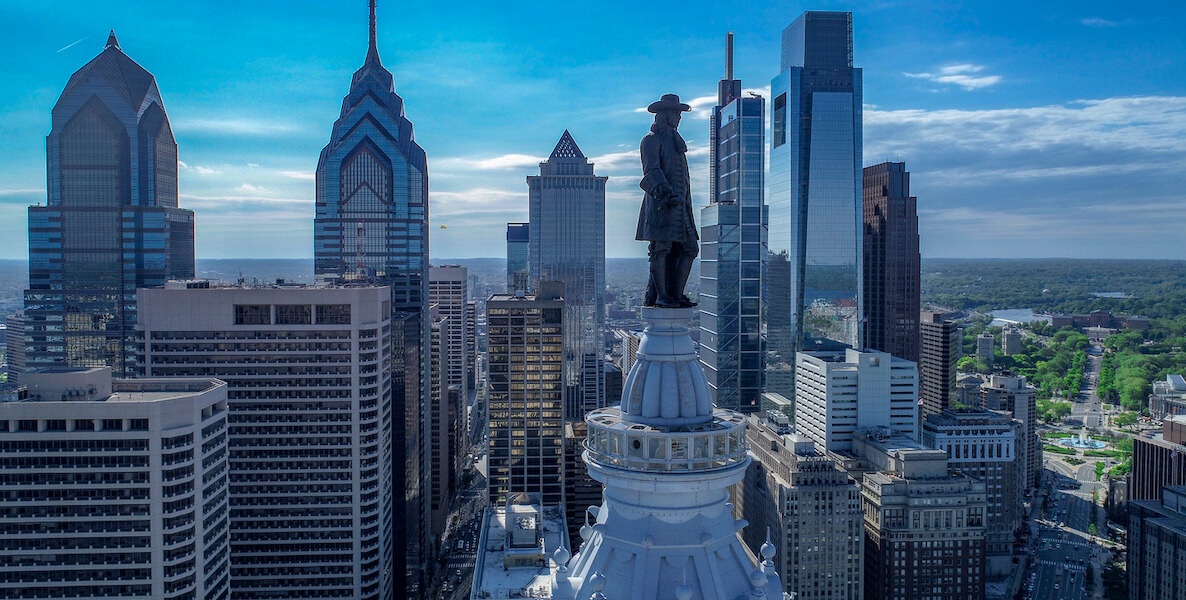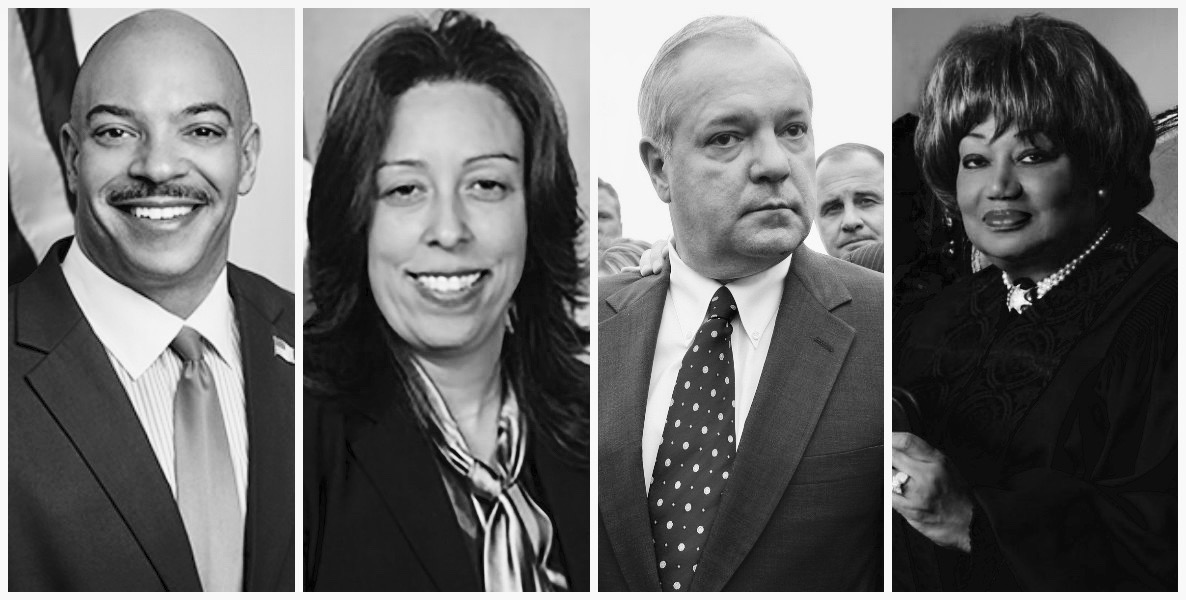![]() Back in the spring, reeling from the economic fallout of Covid-19, Mayor Jim Kenney went into a room with his brain trust of three white guy buddies—some of whom he grew up with—and, focusing on the short-term, emerged with a vision-less, revised budget of indiscriminate budget cuts. (Don’t be surprised if we get an instant replay of this depressing exercise soon, as Covid continues to wreak havoc on city finances.)
Back in the spring, reeling from the economic fallout of Covid-19, Mayor Jim Kenney went into a room with his brain trust of three white guy buddies—some of whom he grew up with—and, focusing on the short-term, emerged with a vision-less, revised budget of indiscriminate budget cuts. (Don’t be surprised if we get an instant replay of this depressing exercise soon, as Covid continues to wreak havoc on city finances.)
Kenney’s cuts prompted the usual complaints from those departments that were being severely diminished or zeroed out, but it also signified something else, as all the tragic drama at the federal level has, as well: In modern times, we need to rethink the definition of government by and for the people.
It’s no longer enough to weigh in once every few years on the job performance of those we hire to represent us. We need to rethink what it means to participate in a democracy; that’s what ol’ Henry II did way back in the 12th century, when he essentially created the jury system.
Sure, there’s a dangerous movement out there of racists and nihilists intent on violence and inflicting damage. They should be dealt with harshly by the law. But the only way to buck up democracy is with more democracy.
That innovation went beyond just requiring government to be transparent; it was also a practical way of turning power over to regular citizens in a participatory democracy, says Beth Simone Noveck, who directed President Obama’s Open Government Initiative and now runs NYU’s GovLab, where some of the most creative experiments around enhancing citizen participation are being incubated, which we’ll get to.
![]() First, let’s stipulate just how dire the need is to rethink the relationship between government and governed here in Philly, with our sclerotic, top-down, and, not coincidentally, corrupt government. Here, a culture of insider, transactional politics still reigns supreme—taxpayer be damned. Here, we get the mayor’s crony—a chiropractor—appointed to head the zoning board, before his (inevitable?) conviction on criminal charges.
First, let’s stipulate just how dire the need is to rethink the relationship between government and governed here in Philly, with our sclerotic, top-down, and, not coincidentally, corrupt government. Here, a culture of insider, transactional politics still reigns supreme—taxpayer be damned. Here, we get the mayor’s crony—a chiropractor—appointed to head the zoning board, before his (inevitable?) conviction on criminal charges.
Here, we get the hiring of a CEO of the city-owned Gas Works, Seth Shapiro (full disclosure: a friend and a local patriot) in a closed process with no discernible outside search.
Here, we get nearly $100,000 secretive payments from the mayor’s political action committee to the head of the NAACP, who promptly reverses his organization’s stance on a regressive soda tax, the mayor’s pet policy agenda.
And here we get multiple City Councilmembers indicted on charges of betraying the public trust by using their all-powerful councilmanic prerogative to personally enrich themselves and their donors while thwarting the public good.
When cranks like me complain, nods are given toward incremental fixes. We get an ethics board. New campaign finance laws. The recent first steps into participatory budgeting, which we here at The Citizen have championed—all of it is enough to seem like systemic change, while never really going far enough to threaten the purveyors of the inside game.
Here, then, are a few radical ideas for Philly to once again model for the world what government of, by, and for the people could look like:
First, there’s NYU professor Noveck’s CrowdLaw program, which turns lawmaking into more of a two-way conversation with city residents. Over 100 legislatures and city councils worldwide have been tutored by Noveck’s GovLab on how to co-create lawmaking with their citizens by tapping into citizen expertise and feedback in real time.
Better Reykjavik, in the capital city of Iceland, crowdsources solutions to city problems. Residents submit proposals and vote on those submitted by others. Every month, the Mayor’s Office reviews what citizens have suggested; 20,000 registered users have submitted nearly 7,000 proposals, and nearly 10 percent have been adopted by local government.
Four years ago, residents in Mexico City helped write the city’s new constitution. The mayor committed to consider any proposal with over 5,000 signatures; ones with 10,000 signatures were automatically put before the group of leaders charged with writing the document. Those that garnered more than 50,000 signatures got to present directly to the mayor. Ultimately, 14 citizen-led petitions were included in the city’s constitutional draft.
Sometimes, CrowdLaw-like interventions can be more modest, but no less game-changing. In San Ramon, California, the fire department released an iPhone app in 2011 that invited citizens to register if they were certified in CPR. When someone, say, was suffering a heart attack, an alert went out to the app’s community—and often lives were saved before EMT could arrive on the scene.
Now, I know what you’re thinking. This is an odd time to be championing the wisdom of crowds after a mob of lawless scumbags has just run amok in the halls of Congress. But that’s kind of the point. Sure, there’s a dangerous movement out there of racists and nihilists intent on violence and inflicting damage. They should be dealt with harshly by the law. But the only way to buck up democracy is with more democracy. Maybe there’s no better way to rescue democracy than by extending to law-abiding but disconnected citizens the power to help run it.
![]() “With legislation and regulation almost always developed by either party leaders or senior officials working behind closed doors, many observers are not surprised that rates of trust in America’s institutions are at historic lows,” Noveck said in testimony before Congress last year. “To help bridge the chronic disconnect between public officials and their constituents, CrowdLaw practices create innovative and efficient pathways that tap into the general public’s expertise and know-how. This knowledge and input are systematically channeled to policymakers before, after, and while they shape legislation and regulations in ways that are efficient and improve the outcomes.”
“With legislation and regulation almost always developed by either party leaders or senior officials working behind closed doors, many observers are not surprised that rates of trust in America’s institutions are at historic lows,” Noveck said in testimony before Congress last year. “To help bridge the chronic disconnect between public officials and their constituents, CrowdLaw practices create innovative and efficient pathways that tap into the general public’s expertise and know-how. This knowledge and input are systematically channeled to policymakers before, after, and while they shape legislation and regulations in ways that are efficient and improve the outcomes.”
Here’s another idea you’ve heard me float before, a way to empower citizens while serving efficiency and accountability in government. Let’s align our councilmembers’ salaries to the mission of governing by taking a page from what has improved management in corporate America—pay for performance.
This idea was first advanced a couple of years ago by Sheila Bair, the former head of the Federal Deposit Insurance Corporation and one of the few heroes of the 2008 Great Recession.
Bair proposed we hold half of each Congressperson’s salary in Treasury bonds, to be released upon three separate triggers: One-third when the nation hit an agreed-upon labor participation rate. Another third tied to the rate of GDP growth. The release of the final third of salary would be determined by the citizens themselves. “Shareholders get to have an advisory vote on executive compensation,” she wrote in Fortune magazine. “Why not taxpayers too?”
“I grew up with the idea that democracy is not something you believe in, or a place to hang your hat, but it’s something you do,” said Abbie Hoffman. “You participate. If you stop doing it, democracy crumbles and falls apart.”
The Trump administration laudably took some steps in this direction, by shifting some civil servants to a system of performance-based bonuses. Obviously, reforms by an administration that declared war on its own government’s “deep state” ought to be taken with a heaping helping of salt. But analysts across the political spectrum agree that pay for performance programs are essential to modernizing government. Why not extend that argument to elected leaders?
I can’t tell you how many press conferences I’ve sat through of local electeds announcing yet another war on poverty—only to ultimately see the numbers barely budge. Don’t you want some power to wield over that Groundhog Day scenario?
A system like this would be akin to saying to Council President Darrell Clarke, et al: It’s time for you to get off the dole. If you believe in merit, you shouldn’t have any problem with half of your salary tied to performance metrics. Let’s say we hold back $66,394.50 of each councilmember’s salary, only releasing it when, say, the city hits a couple of goals: A drop in the poverty rate, for example, and an uptick in employment. The final $22,131.50 would be triggered by a citizen “shareholder” vote. If we’re happy with your performance, you’ll make that scratch.
Finally, no consideration of a new, more collaborative relationship between citizens and their representative government is possible without a bit of media introspection. We allow for selective amnesia in our body politic, which contributes to the alienation voters feel. Media ought to champion change, rather than unwittingly endorsing the status quo, which requires constantly reminding readers and viewers of that which needs fixing.
That’s why we at The Citizen have, no matter the context, taken pains to identify every indicted public figure as just that. Councilmembers Bobby Henon or Kenyatta Johnson hold a press conference on, say, gun violence? They should be identified as under indictment for public corruption—every time.
There’s a risk to this, of course: If they are ultimately acquitted, you can imagine them channeling the words of Ronald Reagan’s Secretary of Labor Raymond Donovan, who, after being found not guilty of federal corruption charges, said on the courthouse steps: “Which office do I go to to get my reputation back?”
But that ultimately is an argument between the public official and the judicial system. In order to fight against the natural tendencies behind the Philly Shrug phenomenon—whereby we come to accept bad actors on our public stage as simply the cost of doing business—the court of public opinion owes its citizens reminders of the alleged transgressions against them at every turn. Working against paralyzing the electorate into apathy ought to be the first step toward a new compact between citizen and those elected to serve her.
The late-sixties’ revolutionary Abbie Hoffman is enjoying something of a comeback lately, thanks to Aaron Sorkin’s portrayal of him in Netflix’s The Trial of the Chicago 7. But, as gripping as that story is, the Chicago trial might not have been the most interesting in Hoffman’s long career of civil disobedience.
![]() That honor might very well go to the 1986 trial in Hampshire County, Massachusetts, when he and Amy Carter, the daughter of the former president, were among 15 protestors charged with trespassing and disorderly conduct during a demonstration against CIA recruiting at the University of Massachusetts. Hoffman, Carter and the other dissidents turned the tables on their accusers and effectively put the CIA’s conduct in Nicaragua and elsewhere on trial instead.
That honor might very well go to the 1986 trial in Hampshire County, Massachusetts, when he and Amy Carter, the daughter of the former president, were among 15 protestors charged with trespassing and disorderly conduct during a demonstration against CIA recruiting at the University of Massachusetts. Hoffman, Carter and the other dissidents turned the tables on their accusers and effectively put the CIA’s conduct in Nicaragua and elsewhere on trial instead.
Hoffman, who would take his own life three years later in New Hope, Pennsylvania, gave an eloquent closing argument in defense of civic participation before the jury verdict of not guilty, and it seems like an apt reminder to us all today:
You heard Ralph McGehee’s testimony of how he was recruited into the CIA. He was told he would be gathering intelligence and we don’t object to that. The country needs intelligence. He wasn’t told he would be part of an assassination team, that he would have to “arrange and doctor” evidence that would show the North Vietnamese were invading the South, that he would have to write a paper to Congress that was a total lie so that Congress could authorize the first bombing of Hanoi…
When I was growing up in Worcester, Massachusetts, my father was very proud of democracy. He often took me to Town Hall meetings in Clinton, Athol and Hudson. He would say, See how the people participate, see how they participate in decisions that affect their lives—that’s democracy. I grew up with the idea that democracy is not something you believe in, or a place to hang your hat, but it’s something you do. You participate. If you stop doing it, democracy crumbles and falls apart. It was very sad to read last month that the New England town hall meetings are dying off, and, in a large sense, the spirit of this trial is that grassroots participation in democracy must not die. If matters such as we have been discussing here are left only to be discussed behind closed-door hearings in Washington, then we would cease to have a government of the people.
The Fix is made possible through a grant from the Thomas Skelton Harrison Foundation. The Harrison Foundation does not exercise editorial control or approval over the content of any material published by The Philadelphia Citizen.







